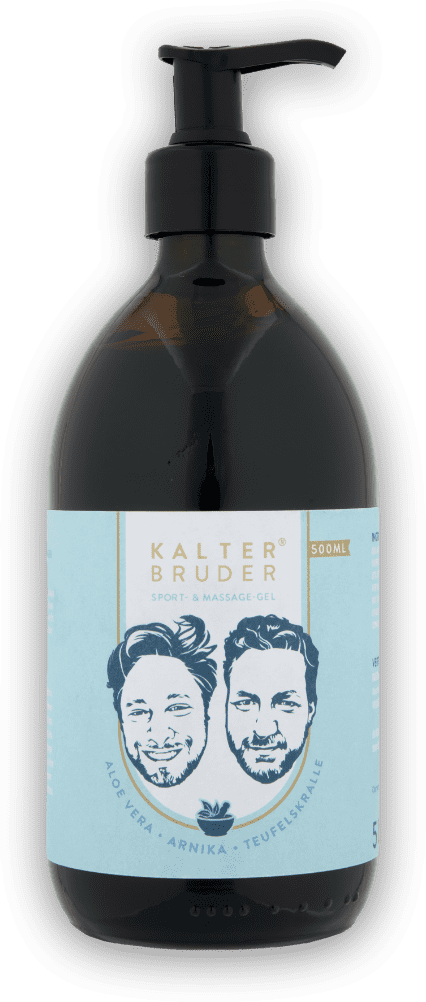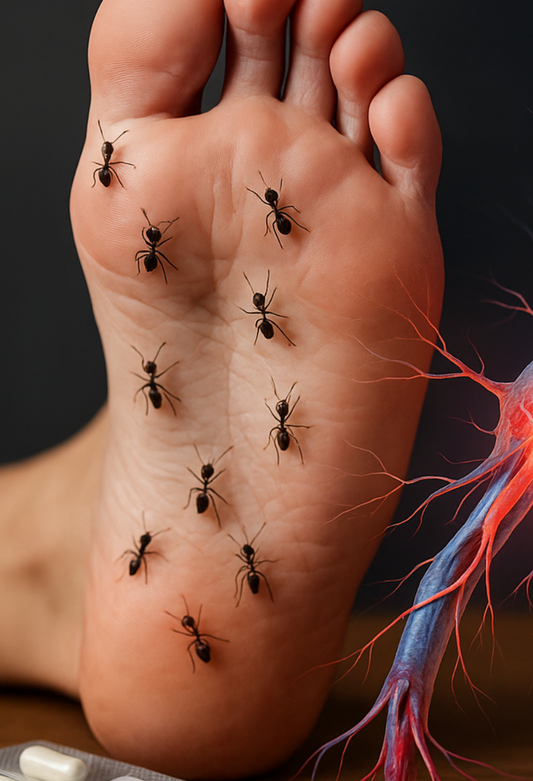Why a deficiency can increase nerve pain and how you can avoid it in winter.
Vitamin B is the key to strong nerves and a healthy body - especially in the cold season, when our organism is particularly stressed. When the days get shorter and the variety of fresh foods decreases, the risk of a deficiency in important vitamins, including the essential B vitamins, increases. Such a deficiency can quickly wear on the nerves and intensify unpleasant symptoms such as more severe pain or tingling sensations.
In this article, you will learn why the B complex, especially vitamins B1, B6 and B12, are real miracle weapons for your nerve health. They promote nerve regeneration, improve nerve conduction and can help relieve unpleasant sensations in the legs and feet. We will also show you how to recognize a vitamin B deficiency early on and how you can counteract it in a targeted manner - be it through the right diet or sensible nutritional supplements. Give your nerves the power they need, especially in the cold season!
Why winter increases the risk of vitamin B deficiency
In winter, many of our lifestyles change. It is colder, we are outside less often and spend less time in the fresh air. This often means that we are less active and eat less balanced. The typical "winter comfort foods" are often high in calories but low in important nutrients - including B vitamins. In addition, the body is often more challenged in winter to defend itself against infections, which can further increase the need for nutrients.
In addition, there are certain medications that can inhibit the absorption of B vitamins. These include proton pump inhibitors (for heartburn), metformin (for diabetes), some antibiotics (such as tetracyclines) and cholesterol-lowering drugs (such as statins), which impair the body's ability to absorb vitamin B and thus increase the risk of deficiency.
The role of B vitamins for your nerves
Your nerves are small miracles: they transmit signals through your body at lightning speed and ensure that every movement and sensation you have functions. But like cables in a technical system, your nerves also need protection - and this is where the B-complex vitamins come into play.
-
Vitamin B1 (thiamine) helps your nerves generate energy. If this vitamin is missing, the nerves quickly become stressed and the risk of nerve damage increases. Studies show that up to 20% of people over 65 are deficient in thiamine, which promotes nerve damage.
-
Vitamin B6 ensures that communication between nerve cells works smoothly. It helps your body produce the necessary neurotransmitters that ensure the exchange of information between nerves. A deficiency can lead to unpleasant tingling sensations and even numbness.
-
Vitamin B12 is essential for the regeneration of the protective myelin sheath that surrounds your nerves like insulation. Without this insulation, your nerves literally become "electrostatic," causing painful sensations. Almost half of all people over 60 suffer from a B12 deficiency.
How do you recognize a vitamin B deficiency?
A vitamin B deficiency often shows itself gradually. At first it may only be a slight tingling sensation or tiredness, but over time more serious symptoms can appear. The most common signs include tingling in the hands or feet, burning or stabbing pain in the nerves, tiredness and exhaustion, as well as problems concentrating or depressive moods.
Older people and people with polyneuropathy should be particularly vigilant here, because the ability to absorb B vitamins efficiently decreases with age. Such a deficiency often remains undetected for a long time because the symptoms do not immediately appear serious.
Did you know? Vitamin B12 is only found in animal foods!
Vitamin B12 is one of the few vitamins that your body cannot produce itself - and you can't get it from plant-based foods either. The reason for this is simple: B12 is produced in nature by special bacteria that are found in the stomachs of animals. That's why you find it in animal products such as meat, eggs or dairy products, but not in vegetables or fruit. This is a problem for vegetarians and vegans, which is why they often have to resort to dietary supplements.
Foods and a sample weekly meal plan for sufficient vitamin B
A sufficient supply of vitamin B can be easily achieved through diet. Here are some foods that are rich in various B vitamins:
-
Vitamin B1 : whole grain products, sunflower seeds, pork
-
Vitamin B2 : Dairy products, eggs, almonds
-
Vitamin B6 : chicken, fish, potatoes, bananas
-
Vitamin B12 : fish, meat, eggs, dairy products
sample weekly meal plan
-
Monday : Breakfast: Oatmeal with milk, banana and almonds | Lunch: Wholemeal bread with cheese and cucumber slices | Dinner: Fried salmon with potatoes and broccoli
-
Tuesday : Breakfast: Wholemeal bread with avocado and an egg | Lunch: Chicken breast fillet with quinoa and roasted vegetables | Dinner: Vegetable soup with lentils
-
Wednesday : Breakfast: Yoghurt with berries and sunflower seeds | Lunch: Omelette with peppers, onions and cheese | Dinner: Fried rice with vegetables and tofu
-
Thursday : Breakfast: Smoothie made from spinach, banana, almond milk and oatmeal | Lunch: Whole wheat pasta with tomato sauce and parmesan | Dinner: Roast chicken fillet with sweet potato puree
-
Friday : Breakfast: Scrambled eggs with whole grain toast | Lunch: Tuna salad with vegetables and olive oil | Dinner: Fried trout with rice and green salad
-
Saturday : Breakfast: Porridge with berries and honey | Lunch: Wraps with hummus, peppers and chicken strips | Dinner: Beef steak with baked potatoes and spinach
-
Sunday : Breakfast: Wholemeal bread with cheese and a boiled egg | Lunch: Vegetable casserole with cheese | Dinner: Spaghetti with salmon and a cream sauce
By integrating this variety into your diet, you ensure that your body is adequately supplied with vitamin B and that your nerves remain strong.
Conclusion: How to optimally support your nerves through the winter
Vitamin B is essential for healthy nerves - this is even more true in winter than usual. A deficiency in these vitamins can significantly worsen your symptoms of RLS or polyneuropathy and lead to painful nerve damage. But don't worry - there is a lot you can do to keep your nerves strong and healthy even in the cold season.
By eating a balanced diet rich in B vitamins and taking supplements when necessary, you can ensure that your nerves get the support they need. Now is the perfect time to boost your nerve health - because in winter your nerves need extra care!















